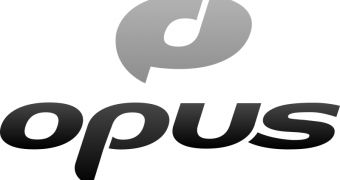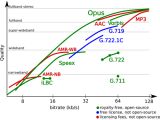Mozilla lost the video codec war. It lost it in the worst possible way, as the last backer of only open-source and free licensable codecs, this despite Google's vow to do the same.
But it learned its lessons, the biggest being that if you want to do something, you have to do it yourself. Equally important is that starting as early as possible is crucial, h.264 had been around for years so it was impossible for any codec to replace it.
When Mozilla conceded defeat with the HTML5 <video> codecs, it was already preparing for the next war, a war that is still to come, the war for the codecs in WebRTC the upcoming browser real-time video and voice calling protocol.
Google started work on WebRTC but Mozilla is heavily involved at this point. So involved that it created a brand new audio codec specifically for WebRTC, Opus.
Seemingly coming out of nowhere, Opus is supported in Firefox 15, the latest stable release. This means that hundreds of millions of people can already play Opus-encoded files and, eventually, streams.
For now, Firefox supports Opus for the <audio> tag, i.e. static audio files on the web. But that's just the first step, Mozilla's real aim is having Opus as the default and mandatory audio codec for WebRTC.
"At the recent IETF meeting in Vancouver we achieved 'strong consensus' to make Opus Mandatory To Implement (MTI) in WebRTC. Interoperability is even more important here than in the <audio> tag," Mozilla explained.
"If two browsers ship without any codecs in common, a website still has the option of encoding their content twice to be compatible with both. But that option isn’t available when the browsers are trying to talk to each other directly," it said.
The group created Opus with the explicit goal of making it available royalty free meaning it had to be free of any patented technology and any methods that can be said to be linked to any existing patents. It's not hard to explain why this is important.
When Google released VP8, part of the WebM video format for the web, plenty of groups claimed that it violated on a number of patents and that they would start asking licenses for it. The only reason why VP8 and WebM aren't involved in a legal nightmare yet is because they haven't really been successful.
Despite the legal limitations, Mozilla also managed to create a very efficient codec, especially for voice communications, which is what it's going to be used for the most. Opus scales incredibly well from very confined bitrates, 8 kb/s or less all the way up to MP3-quality 128 kb/s more than enough for high-quality voice calls.

 14 DAY TRIAL //
14 DAY TRIAL // 
